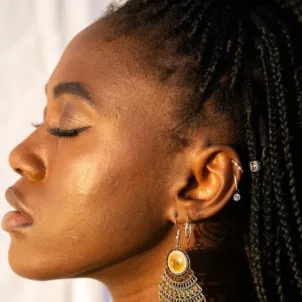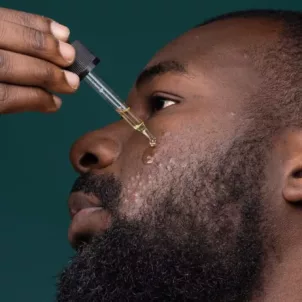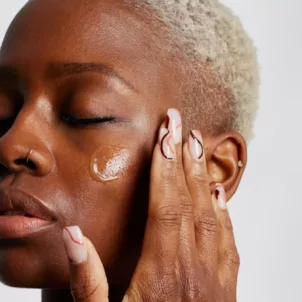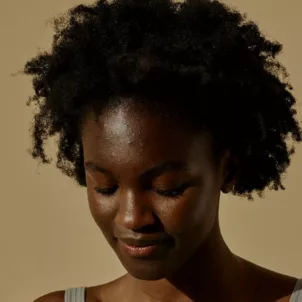Have you ever found yourself wondering, ‘Why won’t my acne go away?’ You’re not alone. We spoke to a board-certified dermatologist to find out why it’s *so* hard to clear up your complexion.
To say I’ve been on a rocky journey with my acne would be an understatement. I first dealt with unwelcome blemishes when I was 13—and with every passing month, more seemed to accumulate. By the time I was 15, my face was covered with pimples. I had been to the dermatologist over a dozen times by then and had tried every topical imaginable but saw no results. I completely lost hope: I accepted the fact that it was simply impossible to clear up my complexion.
When I turned 16, I went on Accutane (a powerful oral retinoid that dries up your skin’s oil glands). In addition to a host of concerning side effects, it came with a promise: clear skin. I excitedly agreed and waited patiently. Normally, people take the medication for four months and see improvement. I was on it for six, and nothing much happened. I continued for a few more months and saw a small difference. But mostly, my skin was just dry, red, flaky, and still covered in pimples. Great.
After one-and-a-half years, my skin finally cleared up—until the week before my period started. I got four giant breakouts on my chin. How was this happening?!
Of course, they went away, but they always came back. My skin was clear for three weeks of the year and then would break out. Like many people who deal with acne, I spent most of my teenage years and early 20s wondering what age acne goes away. I’m (not so) pleased to report that even into my mid-20s, I still suffer from regular breakouts. It got me wondering: Why won’t my acne go away? And, in 2022, when we’ve figured out how to reverse sun damage with lasers and grow back thinning hair, how have we not figured out the magic bullet for acne? I spoke to a board-certified dermatologist to find out.
Why Won’t My Acne Go Away?
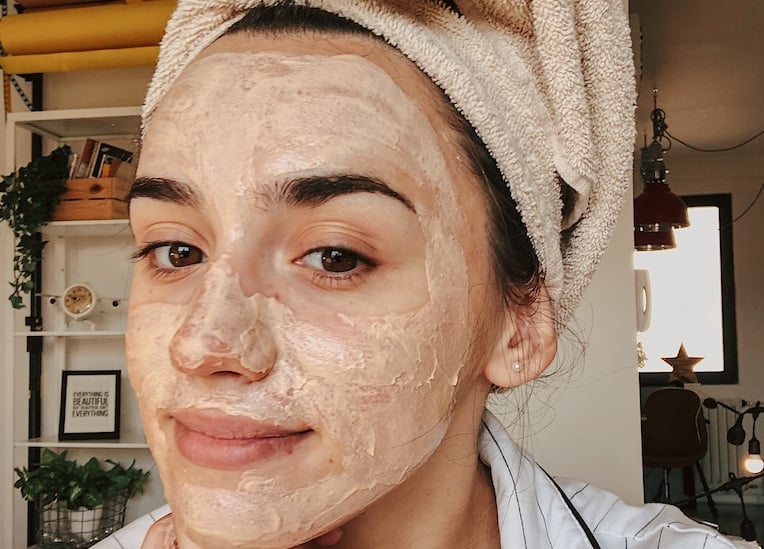
So, why is acne so difficult to get rid of? Caren Campbell, MD, FAAD, a board-certified dermatologist with practices in Napa and San Francisco, breaks down everything you need to know.
There Are Several Different Causes of Acne
To start, there isn’t just one blanket cause of acne. Sometimes it can be difficult to determine (even for derms) what’s triggering your acne, and without understanding the root cause, treatments might be mismatched. (Read: the slew of products you’re slathering on may not even be the right ones.)
These are the main causes of acne:
Hormones
“This is always a driver for acne, which is why we get it with periods, when we hit puberty, and during menopause,” Dr. Campbell says. “Androgen hormones rise during puberty (with testosterone supplementation, etc), which causes increased oil production on the skin from oil glands.” Oil is the ideal environment for acne-causing bacteria to grow in, which is why you notice so many more breakouts during big life stages.
As you age and continue through life stages, you might be dealing with adult acne. If you’re wondering how it’s possible to still be getting pimples into adulthood, the answer also comes down to your hormones. “Hormonal fluctuations that happen during certain times in our lives drive the formation of acne,” Dr. Campbell says. “Examples include puberty, menopause, beginning hormonal types of birth control like IUDs and implanon.” This also happens during pregnancy, as the influx of hormones can cause unwelcome breakouts (but there are pregnancy-safe skincare products you can use to treat them).
Skin Type
Unfortunately, some people are simply more oily than others. If your skin type is oily, you’ll likely be prone to breakouts (since acne-causing bacteria thrives in oily environments).
Diet
“Dairy has been associated with acne, and whey and creatine supplements can also cause and worsen acne,” Dr. Campbell says. “Other things like high glycemic foods show correlation but not direct cause in studies.” So, steer clear of the dairy and sugar, and opt for a plant-based protein powder (like HUM Nutrition’s Core Strength, which is made with pea protein). Certain food sensitivities may also drive inflammation that can lead to increased breakouts. To determine if you may fall into this camp, work with an RD on an elimination diet that can help pinpoint triggers.
Skincare Products
Yes, you read that right. The skincare products you’re using could actually be behind your breakouts. “Avoid things that do not say non-comedogenic, which means non-acne forming or non-pore clogging,” Dr. Campbell says. “Face oils also create a good environment for the acne bacteria to overgrow, so avoid them.”
Medications
Unfortunately, certain medications can cause acne. Dr. Campbell says corticosteroids, lithium, anticonvulsants, barbiturates, androgenic steroids, DHEA, and medications that contain bromides or iodides can all cause breakouts. In fact, even birth control can cause unwelcome pimples.
There Are Several Types of Acne
PSA: Not all acne is created equal. There are actually different types of acne, and each one may require a different treatment. The types of acne include:
- Blackheads
- Whiteheads
- Papules
- Pustules
- Nodules
- Cysts
Some of Your Daily Habits Could Be Making It Worse
You could be causing your breakouts and not even know it. “Working out with makeup or things touching the face like sports equipment, instruments, or hair and skincare products that clog pores can all cause acne,” Dr. Campbell says.
Other acne-causing habits include not washing your pillowcase, resting your face on your hand, touching your phone to your face, or spraying your perfume or cologne directly onto your skin. If you find yourself guilty of any of these, try to be mindful of them. And if you participate in a sport or activity that requires touching something to your face (whether that’s a violin chin pad or a hockey helmet), take extra precautions to wash your face before and after.
There’s Confusing Information on Social Media
As if the world of acne wasn’t confusing enough, social media has added a layer of complexity to it all. Scroll through any app, and you’ll likely be bombarded with conflicting messages, outdated advice, or DIY recommendations that will do more harm than good. (PSA: Please do not apply raw potato to your face or treat your pimples with raw lemon juice.)
Dr. Campbell says skincare advice on social media has made treating acne harder than ever before. While it may be tempting to skip the doctor’s visit and try something you saw on TikTok, it likely will only make things worse. If you’re struggling with acne, meet with a board-certified dermatologist so they can give you a personalized treatment plan.
Results Take Time and Patience
Good things take time, and clearing up your skin is no exception. While that may seem obvious, Campbell says many people don’t understand that treatment takes time. You have to stick with your regimen for a while in order to actually see results.
“It requires understanding and patience, as most treatments take two months or more to work and can be initially drying and irritating,” Dr. Campbell says. “Expecting a quick fix isn’t going to work when treating acne—it takes a few months and some trial and error to get on the right treatment plan.” Once things improve, Dr. Campbell says you need to keep using the treatment plan or the skin will go back to how it was behaving before, and your acne will likely come back.
How to Treat Acne
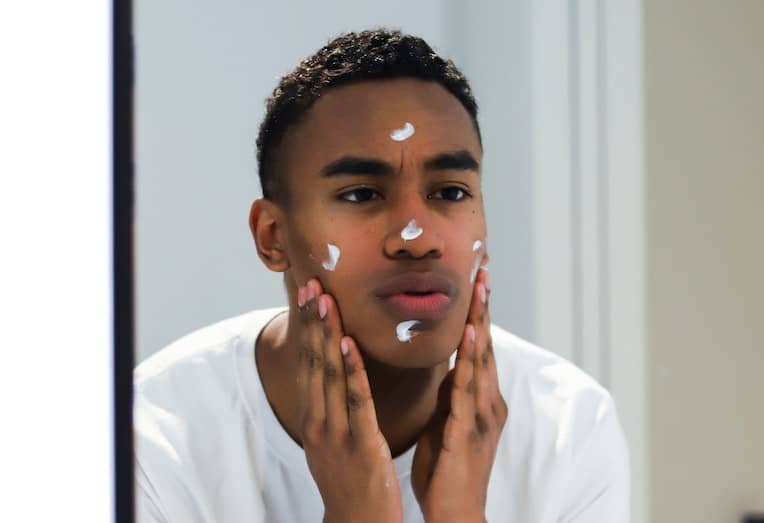
So, how do you treat acne? The best course of action is to see a dermatologist, so they can evaluate your skin and prescribe a personalized treatment plan. Still, there are some things you can do on your own to make any treatment plan more successful.
1. Start a Skin Diary
Take note of when your breakouts happen and what was going on during that time: What did you eat? Were you on your period? Had you had a stressful week? Did you start a new medication? All of these things will help your derm to determine the cause so they can target your treatment.
Always breaking out after Meatless Monday? Take a look at the soy in your diet. Do your breakouts happen after a facial? Your esthetician could be using a product that’s not right for your skin. PMS pimples? That will require a specific course of action.
“Hormonal acne is best treated with things that address the hormones: spironolactone, birth control pills, and spearmint tea,” Dr. Campbell says. Yes, you read that right—spearmint tea could help with your acne. Spearmint tea contains compounds called polyphenols (specifically rosmarinic acid) that has anti-inflammatory, antioxidant, and antibacterial properties, according to an article in the Journal of Medicinal Food. Additionally, a study published in the journal Phytotherapy Research suggests that spearmint tea has anti-androgen properties. Androgens are male hormones (like testosterone), which, if present in excess, can lead to an overproduction of acne-causing sebum.
2. Avoid Obvious Pore-Cloggers
For example, if an external object (like a phone, hand, or helmet) or a skincare product is clogging your pores, then taking it away is important, Dr. Campbell says. Removing makeup and other pore-clogging topicals on the skin before working out is also important.
3. Try a Retinol
“All acne benefits from using retinoids like tretinoin, which help unclog the pore, kill acne bacteria, and are anti-inflammatory,” Dr. Campbell says. You can also pick up a benzoyl peroxide wash, which helps kill acne bacteria and unclogs the pore.
4. Change Up Your Diet.
You already know that dairy and acne are linked, but there are other foods to watch out for. Whey protein powders and high-glycemic foods, for example. Other foods to avoid for clear skin include fast food, coffee, and gluten. Want an extra boost? Consider adding a supplement into your diet. A few of our favorites include:
- HUM Nutrition’s Daily Cleanse, which is made with natural detoxifiers to help promote clear skin from the inside out.
- HUM Nutrition’s Skin Squad, a pre- and probiotic containing nine strains to support a clear, even complexion.
- HUM Nutrition’s OMG Omega The Great, which contains ultra-pure omega-3 fish oil to support a brighter and more even skin tone.
The Takeaway
If you’re struggling with acne, know that you’re definitely not alone—and it’s not a failure on your part. Treating breakouts is difficult for several different reasons: there are several potential causes of acne, many different kinds of acne, and other factors that play a role in your breakouts. And, of course, clearing up your complexion takes time and patience (which is why many people quit their regimens out of discouragement). “It’s a combination of getting on a good routine and then compliance and time,” Dr. Campbell says. “People want a quick fix, and it doesn’t work like that.”
I can personally attest to how defeating it can be to battle breakouts. But with disciplined consistency, I’ve been able to (mostly) keep my breakouts at bay. Remember that it’s normal to have occasional breakouts—and that with time and patience, they will go away.
